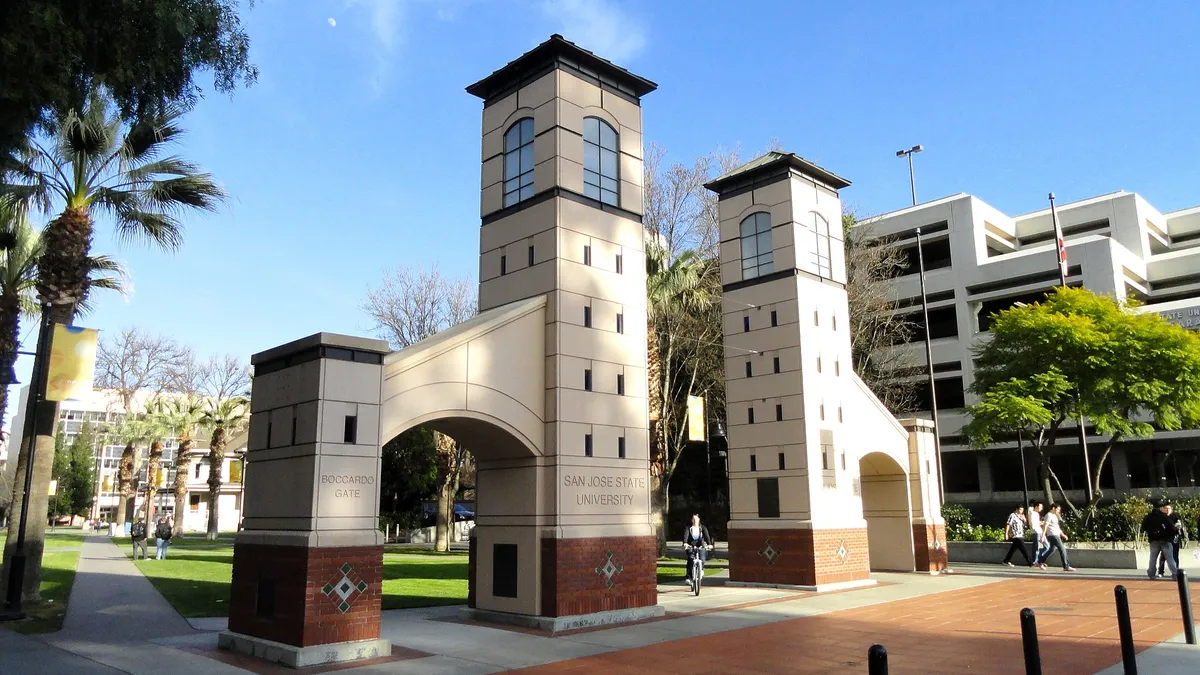Dive Brief:
- San José State University will pay $1.6 million to 13 female student-athletes who were sexually abused by a former athletic trainer, the U.S. Department of Justice announced Tuesday.
- Prosecutors said officials at San José State, part of the California State University system, failed to adequately respond to reports of sexual assault and retaliated against two employees involved in the case, violating Title IX, the federal sex discrimination law.
- The payment to the student-athletes is part of a settlement with the Justice Department's Civil Rights Division and the U.S. Attorney’s Office for the Northern District of California. The university will also need to significantly improve its processes for handling sexual harassment claims, the department said.
Dive Insight:
San José State President Mary Papazian in December 2019 ordered an investigation into Scott Shaw, the university's former director of sports medicine, over accusations he inappropriately touched female student-athletes on their breasts, groins and other areas.
Shaw had been the subject of a similar probe a decade prior but remained employed at the university, a fact made public in a USA Today investigation. Shaw resigned in August 2020 after the fresh allegations came to light.
The Justice Department also initiated an investigation, mostly looking into Shaw's actions from August 2008 to June 2021, though his improper behavior allegedly spanned earlier than those years. Both the department and university investigation, which an outside attorney conducted, identified 23 individuals Shaw had touched inappropriately.
The university had also retaliated against two employees, the Justice Department said. One had repeatedly alerted university officials to the threat Shaw posed. That included filing two complaints raising Title IX concerns and reporting Shaw to the NCAA and the university's athletics league, the Mountain West Conference.
But in 2020, the employee was admonished and given a poor evaluation, allegedly over "unprofessional communications" sent to a coworker. The department found this constituted retaliation. The second employee was fired after raising concerns about the university potentially taking action against the first employee for the Title IX complaints.
Officials' mishandling of the sexual abuse reports and their retaliation against the two employees were Title IX violations, the department said Tuesday.
“No student should be subjected to sexual harassment at a college or university in our country, especially by an employee who wields a position of power,” Assistant Attorney General Kristen Clarke of the Justice Department's Civil Rights Division said in a statement.
The university cooperated with the Justice Department's investigation and will pay $125,000 apiece to 13 of 23 student-athletes Shaw abused. The remainder of the athletes did not accept money.
"We thank all the individuals who courageously came forward during the investigations," the university said in a statement. "To the affected student-athletes and their families, we deeply apologize."
Shaw has denied misconduct, the Associated Press reported.
The accusations against Shaw echo other high-profile sexual assault cases that roiled their campuses and the nation. The U.S. Department of Education fined Michigan State University a record $4.5 million in 2019 for bungling complaints of sexual violence against former sports doctor Larry Nassar.
A judge convicted Nassar of abusing hundreds of women while working for Michigan State and the U.S. women's gymnastics team and sentenced him to up to 175 years in prison.
More recently, Louisiana State University has been embroiled in a scandal over how it handled sexual abuse reports, including against members of its football team. It resulted in the state legislature strengthening reporting laws.
The debate over how colleges should investigate and potentially punish sexual violence on campus has also recaptured interest as the Biden administration reworks the regulation governing Title IX. The White House intends to replace a rule that former Education Secretary Betsy DeVos said was intended to fix a system biased against students accused of sexual misconduct. Sexual assault survivor activists have criticized that rule as limiting the cases colleges must investigate and burdening students who report assaults.














